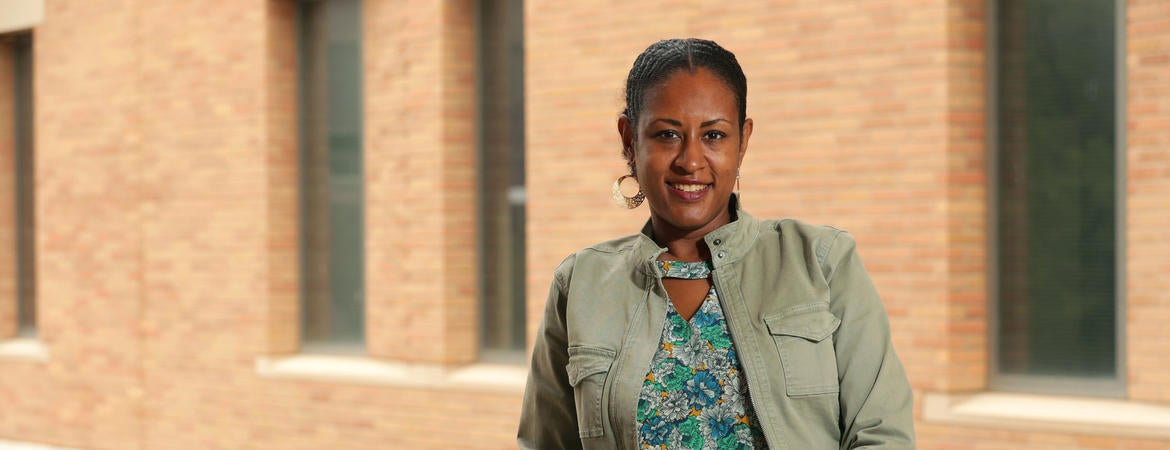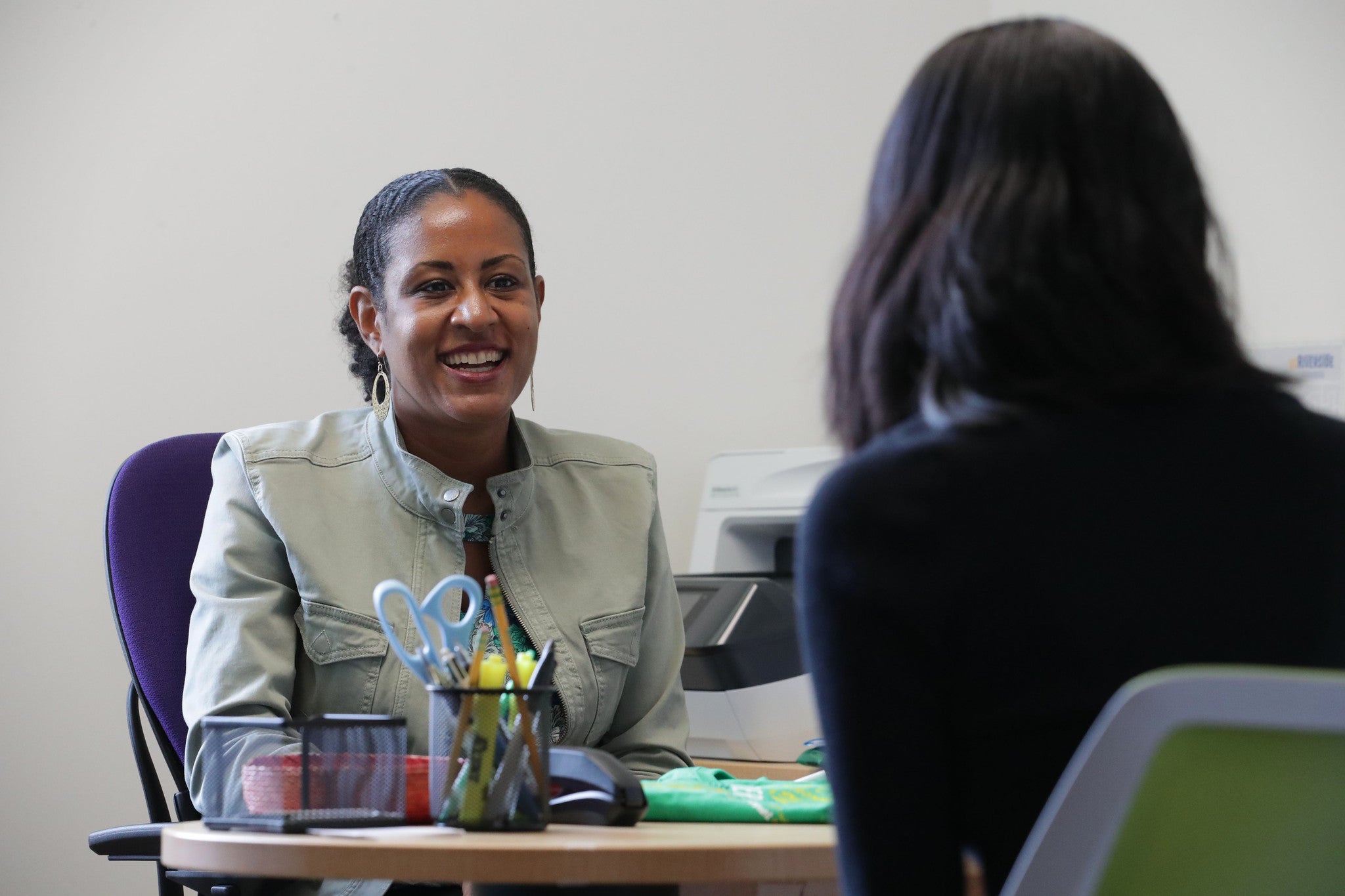College of Humanities, Arts, and Social Sciences

Jade Sasser is a driving force.
As an associate professor of gender and sexuality studies at UC Riverside since 2014, and one of the founders of the sustainability studies major, Sasser has significantly contributed to UCR and in our Inland community.
Sasser has involved her students with UCR’s R’Garden and R’Pantry, two campus resources that offer community outreach to students and Inland residents struggling with food insecurity.
“People who live in the Inland Empire, whether on-campus or ten miles down the road, are facing similar issues with air pollution, with water quality, with potentially living in a food desert and having a difficult time accessing fresh healthy foods,” Sasser said. “It started as an intellectual question and then it became a question of personal values...these are the issues that my students live with every day, so that is why I make sure to take students to the R’Garden and R’Pantry. It’s not just an exercise. I know I have students who are food insecure.”
“The R’Garden is an important resource because of what it stands for in the light of emerging conversations about food security on college campuses,” said R’Garden staff member Crystal Brachetti, class of 2019 and a sustainability studies major. “Professor Sasser prizes the organization and does her best to encourage her students to engage with the space as it relates to the content of her classes.”
R’Garden is also available for use by the Riverside community at no cost. Anyone interested can apply online.
“One thing that I’ve learned is that there’s a long tradition with people here...in Riverside of organizing and mobilizing themselves to respond to environmental problems,” Sasser said. “First you have to understand what’s already being done, who’s already there, what they are doing and how you can help. Understanding community-based activism...should start from the perspective of service and wanting to help support the good work that’s already being done by members of communities who know best what their priorities are and how they would like to find solutions to their problems.”
Sasser’s community involvement extends to the Center for Community Action for Environmental Justice (CCAEJ), located in Jurupa Valley. According to CCAEJ’s website, the company focuses on organizing, advocating and raising awareness around air pollution and toxic exposures for low-income communities and communities of color in and around the Inland region. Sasser has served on CCAEJ’s board of directors and has facilitated meetings between the CCAEJ and UCR’s Sustainability Studies Ambassadors Program, an on-campus, major-specific student program.
“My work on the board [helped] raise awareness of the work they’re doing to help broaden and extend the possibilities for partnership for other organizations,” Sasser said.
Sasser has also been involved with connecting students to an organization called GRID Alternatives, a national nonprofit that provides clean energy and job opportunities to under-served communities. Initially, Sasser got involved with the nonprofit to continue her research on gender and sustainability before sharing the organization’s information with students. Now, sustainability studies students are able to secure an internship with the organization through a major-specific internship course, GSST 198I.
“It’s been a great partnership,” Sasser said. “I did not anticipate it, I thought it would just be me doing research with them. Instead, it has turned into an opportunity for a lot of our students in this major to get real-world experience with sustainability-related issues right here in the Inland community. It has also been a good source of professionalization. They get internship experience, and a number of them receive paid, formal jobs through the organization.”
Sasser’s campus and community involvement was first inspired by a trip to Madagascar with the volunteer program The Peace Corps in 2000. Sasser spent two months with a host family that cooked meals indoors over an open fire, and it was there she realized the significant health impacts produced by burning biomass (substances including firewood, animal dung and leaves). Sasser realized that, by using biomass as fuel to cook, women were disproportionately affected with negative health issues.
Biomass makes up roughly 40 percent of the world population’s fuel use, and long-term exposure to fumes can lead to chronic illnesses, strokes, high blood pressure and respiratory problems. Sasser first realized the negative health effects after developing a chronic cough from prolonged exposure to biomass smoke, and realized she wasn’t the only one with these issues.
“The thing about burning biomass,” Sasser said, “it creates this thick, dense, black smoke that has a lot of particles in it, and when you breathe those particles in, it has negative impacts on your health. If this is how I’m feeling after two months, how does [the host mother] feel after 30 years?”
In 2016, Sasser began traveling to Madagascar and Vietnam more frequently to conduct research on women’s household and cooking fuel use, and began looking at alternatives to biomass usage while studying what makes it easier or more difficult for women to access these alternative options.
“I enjoyed Professor Sasser’s ability to educate each of us about the importance of research...in relation to our major as sustainability studies,” Brachetti said. “She provided us with excellent examples of what methodologies look like for studying socially based scientific questions, in addition to...making me feel seen and heard in the classroom setting.”
In the future, Sasser hopes to continue facilitating collaborations and relationships between gender and energy, and hopes to continue her work both on-campus and beyond campus walls.
FEATURED PHOTO. Photo courtesy of Jimmy Lai '19/CHASS Marketing & Communications
Jade Sasser is an associate professor of gender & sexuality studies who researches gender and energy.
